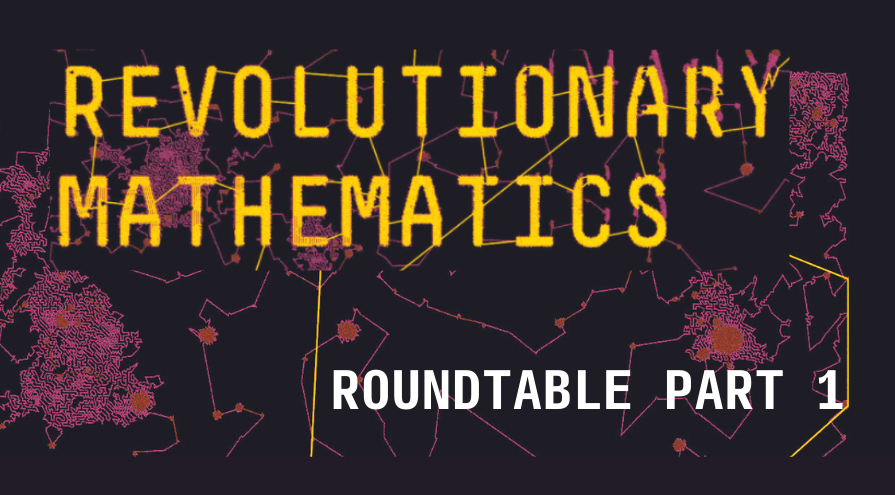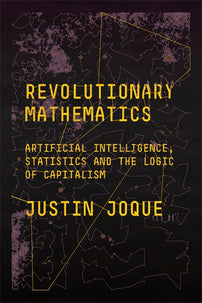Is There an Alternative to Algorithmic Capitalism?
In this entry of the Revolutionary Mathematics roundtable, James Muldoon discusses the role of algorithms in contemporary capitalism, the new politics of the subject, and digital capitalism.

Is There an Alternative to Algorithmic Capitalism?
Mathematicians of the world, unite. Algorithmic capitalism has taken hold of the most recent developments in statistics and placed them in the service of capital accumulation. Justin Joque’s Revolutionary Mathematics investigates how a revolution in statistical methods gave birth to high-frequency trading, just-in-time logistics and targeted advertising. With a particular focus on epistemological questions, it examines how statistics and probabilistic systems create knowledge that compels action.
Joque’s book is the perfect guide to understand how statistics, algorithms and machine learning shape our world and are central to the workings of contemporary capitalism. It reveals that these forms of knowledge production are not objective tools that will naturally lead to greater understanding, but systems that have been appropriated for profit maximisation.
The critical task of a revolutionary mathematics is to interrogate how data is turned into knowledge and to reveal its uncertain and social origins. This calls for critical scholarship to ‘show how algorithmic objects work and the displacements they effect’. This is not to reveal some ‘true’ reality underneath the hood, but to better understand the processes through which our society creates systems of knowledge.
On the question of what possible new methods of knowledge production could replace our data-driven present, the book is decidedly more cautious. ‘We do not yet know what form these new objectifications could take,’ Joque claims, leaving the question of how this political struggle will develop open to experimentation. The book shines in describing the role of probabilistic systems in the latest phase of capitalism’s development, but leaves some questions unanswered in what could and should replace them.
The Capitalist Calculation Problem
At the centre of Joque’s analysis lies the discovery of a perverse incentive system for how data is used in a capitalist mode of production. Competition between firms discourages them from sharing data, resulting in the enclosure of an intellectual commons with data hoarded in enormous private silos. These data cannot be used to solve common problems because probabilistic knowledge production remains tied to organisations looking primarily to achieve strategic advantage over their rivals. Extending David Harvey’s discussion of the enclosure of land and colonial exploitation, Joque argues that ideas and information once considered the common property of everyone have been stolen from the public and used to generate profit.
He points to legal regimes of intellectual property in particular, but also to the general logic of the platform economy in which large companies profit from the ownership of the software on which social and economic interactions take place. Platform capitalists are best at value capture rather than value creation – extracting data from unknowing subjects and organising systems to skim a little bit off the top of digital transactions.
The analysis of data is so distorted by commercial interests that computational power is often used to simply dissimulate and obscure. Take Uber’s ‘Greyball’ program used between 2014 and 2017 to detect when government officials were attempting to use the service in order to refuse them a ride and circumvent potential government regulation. Joque argues that ‘under contemporary capitalism, corporations now fabricate their firms’ economic conditions with a regularity and scale that was once seen to be the exclusive preserve of Soviet bureaucracy.’
Companies also suppress internal research that shines a negative light on their activities and hide away algorithms as closely guarded trade secrets. Despite tech-enthusiasts’ claims that more data will bring greater understanding, algorithmic capitalism has led to a more opaque and alien world that we are further than ever from bringing under conscious control.
[book-strip index="1" style="buy"]The Politics of the Subject
To respond to these new forms of digital manipulation, Joque underlines that we cannot turn to the old tools of the Left. He frames data politics around an interrogation of ‘the revolutionary subject’, which was called into question by feminist, anti-racist and student movements in the 1960s and is now increasingly challenged by digital systems of algorithmic fragmentation, management and control.
Joque finds the Left still trapped within the Western Marxist goal of dereification in which the revolutionary task of the working class is to gain an appropriate understanding of itself and its revolutionary role. This goal is made even more difficult in digital capitalism with the fragmentation of the labour market, the rise of the gig economy and personalised social media feeds, which have ended the possibility of pursuing the conscious and controlled development of humankind.
There is a danger in adopting this perspective that the book confuses the unified subject’s foreclosure with a defeat for progressive politics. Joque associates debates about a single revolutionary subject of history with the impossibility of pursuing any form of ‘subjective’ leftism. Instead, it argues, we should focus on what Marx called processes of ‘objectification’, ‘to interrogate the process by which certain things appear objective: the moment when decisions of social actors cease to appear as decisions and begin to appear as natural and unimpeachable.’
Joque traces how tools from tally sticks to blockchains come to account for human affairs and present our complex social systems as part of an objective world. These knowledge claims matter because revolutions in statistics are also revolutions in production which have real world effects in enabling and compelling action from subjects. The risk of this move is that the emphasis of what matters in revolutionary politics shifts from organising, building power and forming broad coalitions to epistemological struggles over knowledge claims.
The point, however, is to change it
The programmatic aspect of the book could be divided into two: a critical and diagnostic phase, and a positive and experimental one. It sets out a clear agenda for the first, but remains somewhat elusive about the precise nature and goals of the second. The critical section of the book turns a Foucauldian genealogical method onto the politics of knowledge production. In this phase, we should engage in a philosophical critique of how we produce objectifications so that we can reveal how some of our taken for granted ways of understanding the world are in fact the result of a long period of arbitrary and contingent practices.
Uncovering the contingency of the present opens up the possibility that things could be otherwise. But instead of following Foucault in a ‘patient labour’ on ourselves and our desire for freedom, revolutionary mathematics calls for us to ‘fundamentally reconceptualize what we are computing and why’. The question is no longer what is the subject and how can it become more autonomous, but rather how could we allow for ‘the possibilities of new objectifications’. It is only after a critique of the present that we could search for new worlds and understand that ‘another objectification is possible’. The book shares a certain Foucauldian skepticism towards a traditional Marxist revolutionary politics, while still calling for an epistemological revolution in how we understand the use of data in contemporary capitalism.
But all of this critical interrogation leads to important strategic questions. How does a revolutionary mathematician change the world? Which organisations do they work within, which strategies do they pursue and what does this struggle look like in practice? For Joque, there are no examples that can be presented because ‘such a revolution in thought can only be fully ascertained and traced after the fact.’ In this move, we retreat from Marx back to Hegel for whom revolutionary action is ill-advised because true knowledge only ever becomes clear as the precise contours of a new world have already taken shape. It also narrows the focus of revolutionary politics from practical questions of concrete organisational forms to discursive problems of how we conceptualise data relations.
Digital Socialism
What would be the political economy of a society transformed by revolutionary mathematics? The book is adamant that the perverse incentive structures of capitalist economics are at the heart of the misuse of statistics. So which economic system could better align the implicit logic of science – consisting of the pursuit of collective knowledge through free and open inquiry – with a mode of production suited to sharing the benefits of technology more broadly?
In Platform Socialism, I argue that what is needed is new forms of social ownership over digital assets through an ecosystem of alternative ownership structures from the local to the global. Drawing on the pluralist socialist tradition of thinkers such as G. D. H. Cole and Otto Neurath, we can envision a diverse range of communities from local workers co-operatives to municipal and state-owned services aimed towards meeting human need and solving collective problems rather than maximising shareholder value. Revolutionary mathematics seems to go a step further, reminding us that ‘to seize the means of production is both a political and metaphysical task’. If we simply change the ownership model in the digital economy rather than interrogating the structures of understanding through which it operates, ‘we will, in the end, only reproduce the logic we hope to escape’.
This seems to mirror an older claim socialists made following the failure of the Russian Revolution to spread to Europe, in particular to Germany during 1918/9. The German Revolution failed, it was claimed, because the proletariat’s seizure of political power was not accompanied by a revolution in thought and ideals. Even after the collapse of the old regime, socialist forces failed to institute a revolutionary break because they still clung to a bourgeois ideology of liberalism and parliamentary democracy. If we hope to repurpose technology to suit more progressive ends, we need to better understand the metaphysics of contemporary capitalism. The task of a revolutionary mathematics is not simple how we would invent new institutions, but how these must include new forms of knowledge and value as well.
This article is part 1 of the roundtable on Revolutionary Mathematics by Justin Joque. Click here for part 2 and here for part 3.
James Muldoon is a senior lecturer in political science at the University of Exeter and Head of Digital Research at the Autonomy think tank. He is the author of Platform Socialism: How to Reclaim our Digital Future from Big Tech.
